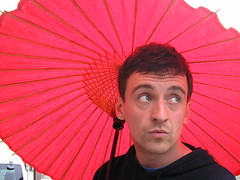Even though this is actually four books, I'm treating them as one, it being the late Mishimas testament to the world.
The tetralogy charts the course of 20th Century Japanese history, and the life of the protagonist, Shigekuni Honda, from student of law to retired judge. As well as a chronicle of the tremendous change wrought it that century, it also records the authors own morbid eroticism and eventual understanding of Buddhist doctrine.
It's difficult to separate this work from Mishimas suicide, committed the day it was completed. The tone becomes more autobiographical as the novels progress - in the first book, Spring Snow, his thoughts are skillfully refracted and given life as people interacting in a changing world. By the end of book four, The Decay of the Angel, it's clear that most characters are Mishima speaking from the heart, and the reader wonders how Japan could have become so different in such a short space of time.
His complex and romantic (some might say self-indulgent) use of language can be hard work at times, especially when he's in the depths of nihilism. Despite that, he is able to paint a concise and powerful picture that reveals his roots as a poet. As Arthur Miller said shortly after Mishimas death,
"His novels are compressed visions."
All in all, the work is magnificent, but it does at times read like an elaborate suicide note.
Thursday, November 23, 2006
Subscribe to:
Comments (Atom)
